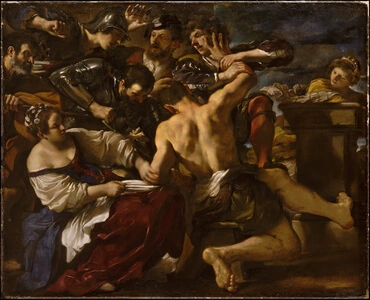1
I mluvil Hospodin k Mojžíšovi, řka:
2
Posvěť mi všeho prvorozeného, cožkoli otvírá každý život mezi syny Izraelskými, tak z lidí jako z hovad, nebo mé jest.
3
Protož řekl Mojžíš lidu: Pamatujte na den tento, v kterémž jste vyšli z Egypta, z domu služby; nebo v silné ruce vyvedl vás odsud Hospodin, aniž kdo jez co kvašeného.
4
Dnes vycházíte vy, měsíce Abib.
5
Když tedy uvede tě Hospodin do země Kananejských, Hetejských, Amorejských, Hevejských a Jebuzejských, tak jakž přisáhl otcům tvým, a dá tobě zemi oplývající mlékem a strdí: tedy vykonávati budeš službu tuto v tento měsíc.
6
Za sedm dní jísti budeš chleby přesné, dne pak sedmého slavnost bude Hospodinova.
7
Přesní chlebové jedeni budou za dnů sedm, aniž spatříno bude u tebe co kvašeného, aniž se uhlédá u tebe kvas ve všech končinách tvých.
8
A vypravovati budeš synu svému v ten den, řka: Proto, což mi učinil Hospodin, když jsem vycházel z Egypta.
9
A budeť tobě to jako nějaké znamení na ruce tvé, a jako památka před očima tvýma, aby zákon Hospodinův byl v ústech tvých; nebo v ruce silné vyvedl tě Hospodin z Egypta.
10
Protož zachovávati budeš ustanovení toto v čas jistý, rok po roce.
11
A když by tě uvedl Hospodin do země Kananejských, tak jakž přisáhl tobě a otcům tvým, a dal by ji tobě:
12
Tedy všecko, což otvírá život, oddělíš Hospodinu, i každý plod hovada tvého otvírající život, což by koli bylo samců, Hospodinovo jest.
13
Každé pak prvorozené osle vyplatíš hovádkem; pakli bys nevyplatil, zlom jemu šíji; každého také prvorozeného člověka mezi syny svými vyplatíš.
14
A když by se tebe vzeptal syn tvůj potom, a řekl: Co jest to? tedy povíš jemu: V ruce silné vyvedl nás Hospodin z Egypta, z domu služebnosti.
15
Nebo když se byl zatvrdil Farao, a nechtěl nás propustiti, pobil Hospodin všecko prvorozené v zemi Egyptské, od prvorozeného z lidí, až do prvorozeného z hovad; i tou příčinou já obětuji Hospodinu všecky samce otvírající život, ale všecko prvorozené z synů svých vyplacuji.
16
Mějž to tedy jako znamení na ruce své, a jako náčelník mezi očima svýma, že v ruce silné vyvedl nás Hospodin z Egypta.
17
Stalo se pak, když pustil Farao lid, že nevedl jich Bůh cestou země Filistinské, ačkoli bližší byla; nebo řekl Bůh: Aby nepykal lid, když by uzřel, an válka nastává, a nevrátili se do Egypta.
18
Ale obvedl Bůh lid cestou přes poušť, kteráž jest při moři Rudém. A vojensky zpořádaní vyšli synové Izraelští z země Egyptské.
19
Vzal také Mojžíš kosti Jozefovy s sebou; nebo byl přísahou zavázal syny Izraelské, řka: Jistotně navštíví vás Bůh, protož vyneste odsud kosti mé s sebou.
20
Vytáhše tedy z Sochot, položili se v Etam při kraji pouště.
21
Hospodin pak předcházel je ve dne v sloupu oblakovém, aby je vedl cestou, v noci pak v sloupu ohnivém, aby svítil jim, aby ve dne i v noci jíti mohli.
22
Neodjal sloupu oblakového ve dne, ani ohnivého sloupu v noci od tváři toho lidu.







